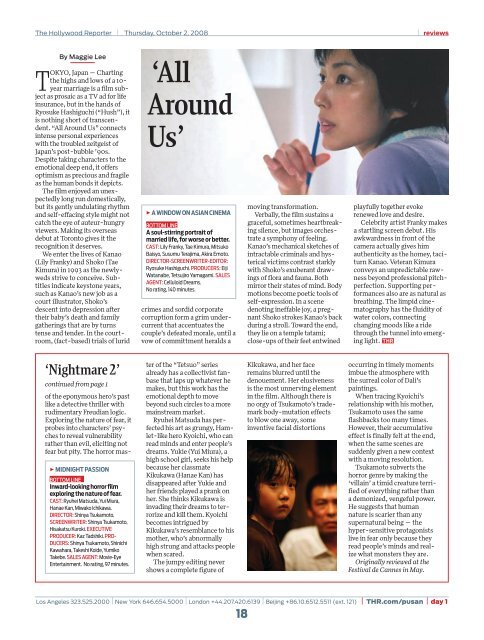Monday, October 2, 2008 - The Hollywood Reporter
Monday, October 2, 2008 - The Hollywood Reporter
Monday, October 2, 2008 - The Hollywood Reporter
Create successful ePaper yourself
Turn your PDF publications into a flip-book with our unique Google optimized e-Paper software.
<strong>The</strong> <strong>Hollywood</strong> <strong>Reporter</strong> | Thursday, <strong>October</strong> 2, <strong>2008</strong> | reviews<br />
By Maggie Lee<br />
TOKYO, Japan — Charting<br />
the highs and lows of a 10year<br />
marriage is a film subject<br />
as prosaic as a TV ad for life<br />
insurance, but in the hands of<br />
Ryosuke Hashiguchi (“Hush”), it<br />
is nothing short of transcendent.<br />
“All Around Us” connects<br />
intense personal experiences<br />
with the troubled zeitgeist of<br />
Japan’s post-bubble ’90s.<br />
Despite taking characters to the<br />
emotional deep end, it offers<br />
optimism as precious and fragile<br />
as the human bonds it depicts.<br />
<strong>The</strong> film enjoyed an unexpectedly<br />
long run domestically,<br />
but its gently undulating rhythm<br />
and self-effacing style might not<br />
catch the eye of auteur-hungry<br />
viewers. Making its overseas<br />
debut at Toronto gives it the<br />
recognition it deserves.<br />
We enter the lives of Kanao<br />
(Lily Franky) and Shoko (Tae<br />
Kimura) in 1993 as the newlyweds<br />
strive to conceive. Subtitles<br />
indicate keystone years,<br />
such as Kanao’s new job as a<br />
court illustrator, Shoko’s<br />
descent into depression after<br />
their baby’s death and family<br />
gatherings that are by turns<br />
tense and tender. In the courtroom,<br />
(fact-based) trials of lurid<br />
‘Nightmare 2’<br />
continued from page 1<br />
of the eponymous hero’s past<br />
like a detective thriller with<br />
rudimentary Freudian logic.<br />
Exploring the nature of fear, it<br />
probes into characters’ psyches<br />
to reveal vulnerability<br />
rather than evil, eliciting not<br />
fear but pity. <strong>The</strong> horror mas-<br />
> MIDNIGHT PASSION<br />
BOTTOM LINE<br />
Inward-looking horror film<br />
exploring the nature of fear.<br />
CAST: Ryuhei Matsuda, Yui Miura,<br />
Hanae Kan, Miwako Ichikawa.<br />
DIRECTOR: Shinya Tsukamoto.<br />
SCREENWRITER: Shinya Tsukamoto,<br />
Hisakatsu Kuroki. EXECUTIVE<br />
PRODUCER: Kaz Tadshiki. PRO-<br />
DUCERS: Shinya Tsukamoto, Shinichi<br />
Kawahara, Takeshi Koide, Yumiko<br />
Takebe. SALES AGENT: Movie-Eye<br />
Entertainment. No rating, 97 minutes.<br />
‘All<br />
Around<br />
Us’<br />
> A WINDOW ON ASIAN CINEMA<br />
BOTTOM LINE<br />
A soul-stirring portrait of<br />
married life, for worse or better.<br />
CAST: Lily Franky, Tae Kimura, Mitsuko<br />
Baisyo, Susumu Terajima, Akira Emoto.<br />
DIRECTOR-SCREENWRITER-EDITOR:<br />
Ryosuke Hashiguchi. PRODUCERS: Eiji<br />
Watanabe, Tetsujiro Yamagami. SALES<br />
AGENT: Celluloid Dreams.<br />
No rating, 140 minutes.<br />
crimes and sordid corporate<br />
corruption form a grim undercurrent<br />
that accentuates the<br />
couple’s defeated morale, until a<br />
vow of committment heralds a<br />
ter of the “Tetsuo” series<br />
already has a collectivist fanbase<br />
that laps up whatever he<br />
makes, but this work has the<br />
emotional depth to move<br />
beyond such circles to a more<br />
mainstream market.<br />
Ryuhei Matsuda has perfected<br />
his art as grungy, Hamlet-like<br />
hero Kyoichi, who can<br />
read minds and enter people’s<br />
dreams. Yukie (Yui Miura), a<br />
high school girl, seeks his help<br />
because her classmate<br />
Kikukawa (Hanae Kan) has<br />
disappeared after Yukie and<br />
her friends played a prank on<br />
her. She thinks Kikukawa is<br />
invading their dreams to terrorize<br />
and kill them. Kyoichi<br />
becomes intrigued by<br />
Kikukawa’s resemblance to his<br />
mother, who’s abnormally<br />
high strung and attacks people<br />
when scared.<br />
<strong>The</strong> jumpy editing never<br />
shows a complete figure of<br />
moving transformation.<br />
Verbally, the film sustains a<br />
graceful, sometimes heartbreaking<br />
silence, but images orchestrate<br />
a symphony of feeling.<br />
Kanao’s mechanical sketches of<br />
intractable criminals and hysterical<br />
victims contrast starkly<br />
with Shoko’s exuberant drawings<br />
of flora and fauna. Both<br />
mirror their states of mind. Body<br />
motions become poetic tools of<br />
self-expression. In a scene<br />
denoting ineffable joy, a pregnant<br />
Shoko strokes Kanao’s back<br />
during a stroll. Toward the end,<br />
they lie on a temple tatami;<br />
close-ups of their feet entwined<br />
Kikukawa, and her face<br />
remains blurred until the<br />
denouement. Her elusiveness<br />
is the most unnerving element<br />
in the film. Although there is<br />
no orgy of Tsukamoto’s trademark<br />
body-mutation effects<br />
to blow one away, some<br />
inventive facial distortions<br />
playfully together evoke<br />
renewed love and desire.<br />
Celebrity artist Franky makes<br />
a startling screen debut. His<br />
awkwardness in front of the<br />
camera actually gives him<br />
authenticity as the homey, taciturn<br />
Kanao. Veteran Kimura<br />
conveys an unpredictable rawness<br />
beyond professional pitchperfection.<br />
Supporting performances<br />
also are as natural as<br />
breathing. <strong>The</strong> limpid cinematography<br />
has the fluidity of<br />
water colors, connecting<br />
changing moods like a ride<br />
through the tunnel into emerging<br />
light. ∂<br />
occurring in timely moments<br />
imbue the atmosphere with<br />
the surreal color of Dali’s<br />
paintings.<br />
When tracing Kyoichi’s<br />
relationship with his mother,<br />
Tsukamoto uses the same<br />
flashbacks too many times.<br />
However, their accumulative<br />
effect is finally felt at the end,<br />
when the same scenes are<br />
suddenly given a new context<br />
with a moving resolution.<br />
Tsukamoto subverts the<br />
horror genre by making the<br />
‘villain’ a timid creature terrified<br />
of everything rather than<br />
a demonized, vengeful power.<br />
He suggests that human<br />
nature is scarier than any<br />
supernatural being — the<br />
hyper-sensitive protagonists<br />
live in fear only because they<br />
read people’s minds and realize<br />
what monsters they are.<br />
Originally reviewed at the<br />
Festival de Cannes in May.<br />
Los Angeles 323.525.2000 | New York 646.654.5000 | London +44.207.420.6139 | Beijing +86.10.6512.5511 (ext. 121) | THR.com/pusan | day 1<br />
18










